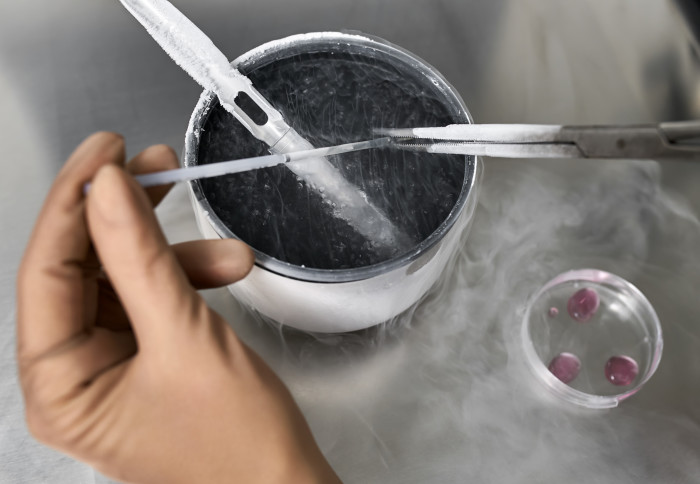Women who freeze their eggs at 40 are unlikely to have a successful livebirth

A new study has found that women who freeze their eggs at 40 are unlikely to have a successful livebirth when they come to attempt pregnancy.
The study, co-led by Dr Lorraine Kasaven and Dr Benjamin Jones from the Department of Surgery and Cancer and the Department of Metabolism, Digestion and Reproduction, suggests women should be encouraged to undergo elective oocyte cryopreservation (egg freezing) before the age of 36 as a mitigating measure of age-related fertility decline. When the procedure is performed above this age, the chances of successful livebirth are significantly reduced.
Previous research and advice has recommended that women should freeze their eggs before the age of 35, with emphasis placed on the number of good eggs successfully frozen. In contrast, this new study looked specifically at what happens when women return to use their eggs to attempt pregnancy.
Working with a retrospective cohort of 373 women, this new study found that no livebirths were achieved in women who underwent egg freezing after 40 years old. In comparison, 82% of all livebirths were achieved in women who had frozen their eggs between 36 and 39.
Miss Jara Ben Nagi, supervisor of the study, said: "Although this data is from a single IVF centre with experience in egg freezing, women must be counselled about the poor outcomes when they embark on egg freezing above the age of 40”
Elective oocyte cryopreservation is now a well-recognised and accepted method of fertility preservation, with many women wrongly seeing the procedure as a last resort to salvage their fertility.
However, the results from this study suggest the procedure should be seen as a viable option for fertility preservation, and, as such, women should be encouraged to undergo egg freezing much earlier than the evidence suggests they are currently doing.
Kasaven, L.S., Jones, B.P., Heath, C. et al. Reproductive outcomes from ten years of elective oocyte cryopreservation. Arch Gynecol Obstet (2022). https://doi.org/10.1007/s00404-022-06711-0
Article text (excluding photos or graphics) © Imperial College London.
Photos and graphics subject to third party copyright used with permission or © Imperial College London.
Reporter
Benjie Coleman
Department of Surgery & Cancer